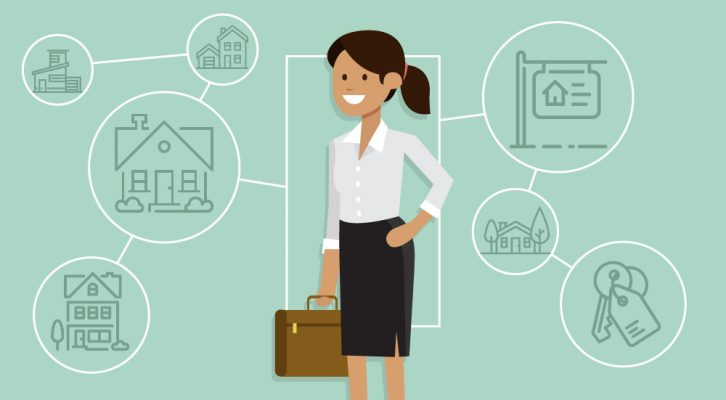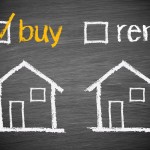Weigh the pros and cons of buying a house before jumping into the real estate market.
Raise your hand if you’ve found yourself running the following dialogue loop in your head when trying to decide if you’re really (really) ready to buy a house.
1. Homeownership is a never-ending time and money suck.
2. But renting is like throwing your money down the drain.
3. And, hey, you’re young! Why tie yourself down with a house?
4. But other people your age own homes — shouldn’t you own a home by now?
(And repeat…)
Stop the one-sided, one-way conversation in your head and read these pros and cons of buying a house to decide what’s right for you.
Pro: Ability to customize
Hate the chintzy cabinets in your kitchen? Dying to turn that laminate countertop into a solid piece of granite? As a renter, you have limited ability to customize your surroundings. As a homeowner, you can make your home your canvas. Paint the walls, knock down a wall, create your dream kitchen — no one can tell you what you can or cannot do to your home. No one but your homeowners’ association, that is.
Pro: Freedom to live how you want
Want to foster dogs, own five cats, and have tunnels for your gerbils to navigate through your rooms? Go for it. Want to host a cookout on your deck? Start up the grill.
As a renter, you’re subject to your landlord’s rules about pets, outdoor spaces, and other lifestyle choices. As an owner, you can do almost anything, as long as it’s legal and you don’t disturb the neighbors.
Pro: Financial perks
Owning a home can help you build equity. You can also write off mortgage interest at tax time, get tax credits for certain improvements (such as energy-efficient windows), and turn your unused rooms into rental units for extra income.
Pro: Fixed monthly payments
As long as you’re on a fixed-rate mortgage, your mortgage payments will remain steady (although in some cases, they could go up). But long term, as inflation kicks in, you’ll repay your mortgage in cheaper dollars over time.
If you’re a tenant, unless you live in a rent-controlled area, your landlord can increase your rent anytime your lease is up for renewal. And if your lease is month-to-month, your landlord could legally raise the rent every 30 days.
Still not sure which is the better decision financially? Try Trulia’s rent vs. buy calculator to get an objective second opinion.
Con: Less flexibility
If your circumstances or preferences change, you no longer have the flexibility to move quickly. As a renter, if you lose your job, realize you hate your neighborhood, or decide to move in with your significant other, you can move as soon as your lease expires (or plunk down whatever cash is necessary for an early lease termination).
If you own a home, by contrast, you’ll have to endure extensive additional expenses, hassle, and stress to sell (or rent out) your home before you can move to your next spot.
Con: Limited access to amenities
When you move to a house, you may not be able to access top-quality amenities you were used to as a renter. You may be saying goodbye to that on-site gym and swimming pool and the valet trash service.
Con: More responsibility
As soon as a home is in your name, the maintenance and repair hassles are now your responsibility. That leaky faucet will no longer be magically fixed for you while you’re at work, and you’ll have to start making time to mow the lawn in the summer and shovel snow in the winter.
Con: More financial pressure
Owning a home is a long-term financial responsibility. If you’re a renter and you’re hit with a financial hardship, you can move into a less-expensive rental. As a homeowner, you’re stuck with your mortgage (or you can try a refinance). If the idea of paying a mortgage for 15 to 30 years makes you hyperventilate, you’re probably not ready for homeownership.
Con: Costly surprises
As a homeowner, you face a lot of potentially expensive surprises, such as a roof that suddenly starts leaking or a sump pump that fails and lets your basement flood. As a renter, your biggest potential surprise expense is a rent hike when your lease is up for renewal — and if you don’t like the proposed rent increase, you can negotiate or move.
So how do you know if you’re really ready to buy?
In addition to the lifestyle factors listed above, take the time to thoughtfully answer these five questions.
1. Where do you see yourself in three to five years?
2. How long do you plan on living in the same town?
3. How stable is your job?
4. Can you afford a home you can “grow into” in the next decade?
5. Are you prepared to sink a large amount of money into purchasing and maintaining a home, or do you have other financial goals you’d rather focus on?
When did you know you were ready to settle down and buy a house? Share your pro/con lists with us in the comments below!
Author/Source: Trulia.com


























